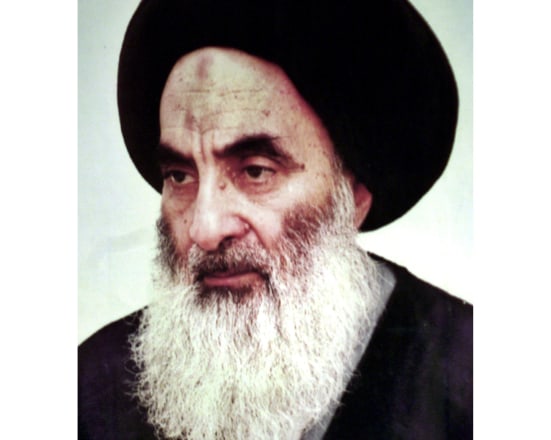The Washington Post
Friday, March 27 2015
WorldViews

Call to arms a reminder of the power of Iraq’s Ayatollah Ali al-Sistani
Washington Post
By Abigail Hauslohner June 13, 2014
It has been a while since Americans paid much attention to Grand Ayatollah Ali al-Sistani, Iraq’s top Shiite cleric.
But a call to arms issued at Friday prayers in Baghdad served as a reminder of the power that Sistani yields in a country that is once again fracturing along sectarian lines.
With Sunni militants gaining territory rapidly, a representative of Sistani told followers that the defense of the country against those “terrorists” was a “sacred goal,” and that anyone who died fighting to that end “will be a martyr.’’
Sistani emerged from relative passivity after Saddam Hussein’s ouster by U.S. forces in 2003 to become a vocal religious and political guide for Iraq’s suddenly empowered Shiite masses.
His words Friday marked a radical departure for a man who has played a powerful hand in shaping Iraqi politics, but has typically urged Iraqi Shiites to resist provocation to sectarian bloodshed.
And as the most powerful religious authority in Iraq, Sistani’s words were likely to find support among the country’s Shiites and political leaders, who are desperate to hold on to power and have a fleet of well-trained Shiite militias ready to act.
Sistani was born nearly a century ago into a family of religious scholars in Iran, and spent his youth there before taking up a humble residence in Iraq's holy city of Najaf.
He survived Saddam Hussein’s brutal crackdown on Shiite opposition and members of the Shiite clerical community by staying silent.
Under Maliki’s government, Sistani’s power as a religious leader expanded. Shiites often solicit religious advice or decisions from Sistani on topics that have ranged from from marriage and war to computer games and sports.
Now 83, Sistani has spoken repeatedly in recent years of retirement. It’s unclear why he has never followed through.
Experts say Sistani, who still speaks with a Persian accent, maintains close ties to Iran’s powerful clerics — and controls the purse strings of a vast charitable Shiite empire.
Andrew Tabler, an expert on Arab politics at the Washington Institute for Near East Policy, said Sistani’s call to arms most likely reflected some collaboration with Tehran.
Abigail Hauslohner covers transportation and development for The Washington Post. Previously, she served as the Post’s Cairo bureau chief.
No comments:
Post a Comment